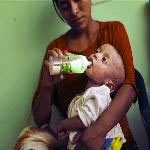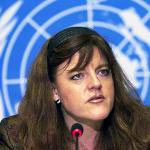
The United Nations Children's Fund is appealing for $1.2 billion to provide life saving emergency assistance to millions of children and women in dire need. UNICEF says earthquake-stricken Haiti is only one of 28 countries where children and women lack even the most basic means of survival.
In previous years, the U.N. Children's Fund has classified Haiti as a country 'in crisis.' Since the devastating earthquake struck, UNICEF has increased its efforts to restore shattered lives and protect children and women who are among the most vulnerable victims of this disaster.
While Haiti remains a priority, UNICEF Deputy Executive Director, Hilde Johnson tells VOA there are many other emergencies that are critical and must be addressed.

"We need to scale up our efforts delivered in Haiti, but we also need to ensure that children all over the world - in the Horn of Africa, in Afghanistan, in Pakistan, in the Democratic Republic of Congo, in Sudan, in Chad - all these children actually deserve and have the right to the same assistance as children everywhere else," she said. "And, we must not now only be one-sided. We need to be able to show that we care and plan to assist all these children globally," said Johnson.
Johnson says children are always among the most severely affected, and disasters put them at increased risk of abuse and grave violations of their rights. She says children are at risk of sexual violence, killing and maiming, and forced recruitment into armed groups.
Every year, UNICEF responds to some 200 emergencies around the world. These crises are most acutely felt in the 28 countries that figure in the Humanitarian Action Report.
The greatest needs are in sub-Saharan Africa, where some 24 million people in the Horn of Africa are being affected by drought, chronic food insecurity and armed conflict.
UNICEF's three biggest operations are in the Democratic Republic of Congo, Sudan and Ethiopia. Johnson says more than six million people in Ethiopia are going hungry because of drought and famine. She says children there are at risk of severe and acute malnutrition.
"In Sudan, the combination of conflict and drought, instability and the situation in Darfur, which is still difficult," she explained. "And, in south Sudan it is getting worse. In DRC, the Democratic Republic of Congo, we are well familiar with challenges in the eastern part of the country, where we still have thousands and thousands of people on the move. And, where women and children and girls are subject to sexual violence."
While the crises in these three countries are relatively well known, there are a number of countries that remain largely forgotten. Johnson cites the Central African Republic as one country where children suffer from instability and lack of basic services. Yet, she notes little is ever heard about what is happening there.
Niger is an example of another forgotten country. UNICEF's Hilde Johnson says Niger is always at risk of famine. Any marginal changes in the weather, she says, can drive thousands of children into a situation of severe and acute malnutrition.
UNICEF reports the global financial crisis and unstable food prices are increasing poverty and malnutrition. And this, it says, is severely threatening progress that has been made for children in some developing countries.
Child brides in Yemen seek legal protection
Humanitarian situation in Southern Sudan in crisis
Russian woman continues fight for equal rights in employment
Clinton pushes UN resolution to curb violence against girls
(來(lái)源:VOA 編輯:陳丹妮)
